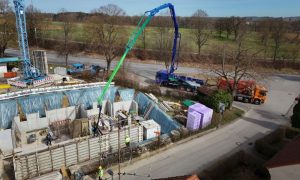How Hill International answered the Sultanate’s call
Adel Merhi, Hill International, on how the consultancy helped bring to fruition two of Oman’s most vital aviation projects

“The client’s brief for the projects has been achieved. They wanted state-of-the-art airports, and they’re going to get that. They’re not building airports to compete with the rest of the GCC, they are building airports that answer the requirements of the country”
Earlier this year, Oman’s Ministry of Transport declared that the new passenger terminal at Muscat International Airport would open in March, with all incoming and outgoing flights to be transferred from the old terminal to the new one. Dr Ahmad Al Futaisi, Minister of Transport and Communications, said the new terminal would serve as a “focal point for the world”. Claiming it would be a landmark of modern state monuments, he also highlighted that the new terminal would greatly benefit the sultanate’s national economy, particularly in light of the growth seen in civil aviation and other sectors.
The revamped Muscat International Airport will have the capacity to handle more than 12 million passengers annually, with ultimate expectations rising to 48 million passengers a year. Spread across an area of 335,000sqm, it will have 6,000sqm of duty-free shopping, 8,000 parking spaces and 96 check-in counters. The total built-up area of the passenger building is 580,000sqm, with the terminal consisting of three suites, each with three levels.
Retail outlets on both sides of the building cover an area of 12,000sqm. There are lounges for first and business class passengers, offices for airlines and other miscellaneous airport facilities. The building also accommodates a four-star, 90-room hotel.
With 40 aerial bridges and 29 waiting areas, there are ample systems to handle the increased volume of passengers and the larger aircraft currently in operation across the world’s airlines, such as the Airbus A380.
As handover is scheduled to happen imminently, Big Project ME met with Adel Merhi, Head of Projects and Country Manager for Oman at Hill International, to discuss how the American construction consultancy helped bring the airport to completion.
Having started its services at the project on 1 January 2013, Hill International was hired by the Ministry of Transport and Communications and the Public Authority for Civil Aviation of the Sultanate of Oman to provide consulting engineering services for the $5.2 billion expansion and modernisation of the Muscat and Salalah airports.
“On this project, we are not the project managers – we are the supervision consultants, and we provide commercial and contractual services,” Merhi says. “However, we work very closely with the client and the project manager, who was here before we arrived. Now the project management team is part of the client’s team, and basically the client has taken on the role of the project manager. They work closely with us to coordinate all the interfaces on the project.
“It’s really about working hand in hand with the client, and this is done through various high-level meetings and also through many other interface meetings that take place on a weekly basis, sometimes twice a week, as and when required.”
With the opening of the revamped airport so close when Mehri talks to BPME the majority of construction work is well over, barring a few minor items.
“Mainly, the challenges we faced on this project are normal for a project of this magnitude,” Merhi says. “They were mainly around the interfaces between the different contract packages, and we worked with the client [to resolve them]. They were very helpful. There was assistance from the top senior management from the client’s side, working with us and the contractor, to resolve those interface issues. We had, and still have, a dedicated team for the interfaces between the different contract packages.”
Having this level of cooperation is crucial, Merhi says, pointing out that the airport uses the latest technology and it is crucial that all systems work smoothly. To achieve this, the client’s team, Hill International and the designers coordinated with each other and ensure that the latest technology was implemented on the project.
The other airport in the contract signed by Hill International at the same time as Muscat International Airport was the Salalah Airport, which opened in June 2015. With the airport fully operational, Merhi says it stands up to comparison with any other airport in the GCC region and has been crucial to the economic growth of an important region of the country.
“When you come to the airport, you feel like you’re in an international, high-level airport,” he says. “That gives a good impression to visitors, and there are a lot of visitors who come directly to Salalah from across the GCC. Salalah as a region is expanding. Many hotels are under construction, and I believe that the airport is going to help expand tourism. This is a new airport with two new runways and a new terminal.
“While it was a normal construction process, for us the biggest challenges are, whether it’s a small building or a major project, always challenges with interfaces, and that was no different with the airport of Salalah. We had interfaces between different systems that we needed to address, which we did in a professional way, and we managed to deliver a state-of-the-art airport.”
One issue was ensuring there were adequate materials and supplies in place. Given that the city is on the other side of the country, well away from the main hub of Muscat, Merhi says proper planning was crucial.
“Of course, Salalah is not the capital, but we dealt with the issue of supplies with proper planning well ahead of time. We had people dedicated just for procurement, making sure that materials come in on time. Some of the materials were supplied locally – the concrete and blockwork, things like that.
“Anything that was available from Salalah was used, but others came either from Muscat, from the region or internationally. We kept a procurement log, and if there were any possible delays for anything, we knew in advance and could then get in touch with the suppliers directly, and even travel with them – to make sure that things were delivered on time.”
With Muscat International Airport now set to be delivered as well, Merhi reflects on the two projects, stressing that they will have an impact on Oman’s economy for years to come.
“The client’s brief for the projects has been achieved. They wanted state-of-the-art airports, and they’re going to get that. They’re not building airports to compete with the rest of the GCC, they are building airports that answer the requirements of the country. I believe that the country is coming into a big expansion phase, and so these airports are a vision for the future.
“They were really good projects [to work on]. Hill International had worked, and continues to work, very closely with our clients and stakeholders to deliver the Salalah Airport, and now the Muscat Airport as well.”















